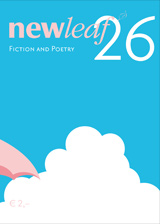editorial

Alphabet soup
‘Vether it's worth goin' through so much to learn so little, as the charity-boy said ven he got to the end of the alphabet, is a matter o' taste.’
(Sam Weller, in Dickens' Pickwick Papers (1837))
Like a few other small-scale publishers, we believe we are the lucky ones; those who have found out that exciting literature is made in the realm of independent magazines, collections and chapbooks, where the turnover is much faster than for book publications: the art we produce is often very responsive to current trends and moods. Because our print runs are smaller, the risk can be relatively low and some authors are published whose work might be deemed too risky for a large-scale book publication.
We begin this magazine with the cheerful assertion of feeling a little bit lost, but nevertheless loving the adventure and the risk. In story-telling, the teller might not always know where the action is going; it develops during the act of performance; it changes depending on who tells the story, who listens to it. The act of literature in performance is very much a newleaf tradition – our launches and other readings have always relied on authors reading their own work and on the public space as their first acid test. Thus, this editorial is also shout-out to our friends at the Forest Café in Edinburgh, a place rooted in the public performance of art, where quite a few of our authors have heard of newleaf and have submitted work to us.
And so now newleaf is no longer the purely Bremen magazine it started out as. We have grown to become a truly international journal; our authors in this issue come from England, Scotland, Ireland, the US, and of course other parts of Germany. However, we are pleased that the Hansa connection lives on: not only do we have local authors of the ‘old hands’ variety but we are Proud To Present a bunch of poems written by first-year students in the Introducing English Literatures seminar. The assignment – as preparation for an analysis of Blake's ‘London’ and Wordsworth's ‘Written on Westminster Bridge’ – was to stand on a Weser bridge early in the morning and observe the city. Poems are bridges, after all, so we have arranged a selection of these texts as stepping stones, like those boards on a hot hot beach that lead you to that cool umbrella. But then you never know when it's going to rain …
Publishing poems inspired by pictures is difficult if the reader doesn't have the visual reference point. We are publishing from a series in progress by Sabine Broeck on the Black experience in Western art two poems which refer to three classic European paintings (as well as two poems by William Carlos Williams). Although the texts stand superbly on their own, we can recommend the reader to have a look at the paintings in question: the 1523 Titian portrait; J.M.W. Turner's disturbing 1840 picture of slaves being thrown overboard; and Brueghel's Fall of Icarus (1558).
You may have noticed that this issue presents a new feature which we have stolen unashamedly from the British magazine The Rialto, which publishes at the beginning of every issue a poem from the past. This time we've called it Editors' Choice, but we're willing to do requests; so let us know what favourite of yours you'd like to see in newleaf 27 and later. The only precondition is that it's already free from copyright; don't suggest Sylvia Plath or we'll have to pay out millions of dollars to Faber and Faber in or out of court. Julia Boll's selection this time is by Lewis Carroll.
So, like the editors of this little magazine did in December, indulge yourselves: read the texts aloud, by yourselves, to friends, family, colleagues, random strangers on the train. Feel the words dance on your tongues, taste their consonants and listen to the echo of their vowels. See how the texts change when given a voice, how suddenly other texts vibrate within them.
Feel the rush of new literature.
Julia Boll, Simon Makhali and Ian Watson, January 2010
contents
-
Jabberwocky (1872)
-
Southern roads
-
Bridge
-
The boy
-
The two tone invader
Holiday by the sea
-
Crossing over
Toro
-
Weser bridge
-
Great expectations
-
My father on snake bites
-
Fight club
-
Slaves flying icarus painting
Velvet blue
-
No signals
Cleaning lady
TC
Barn town
-
Dance me to the end of love
-
Bridge 2.0
-
The business of ravens
November
Full moon low tide
-
Things you told me
On the day the streetlights went out
-
The absence of you
Under the bridge
-
Nightly
-
For all the meals we never ate together
-
Canary lungs
